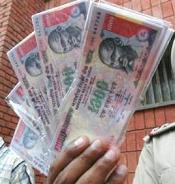 | « Back to article | Print this article |
 Food inflation has entered negative territory but consumers have had no respite on cost of living.
Food inflation has entered negative territory but consumers have had no respite on cost of living. The data was compiled by CARE Ratings based on Delhi prices sourced from the agriculture ministry.
The family's monthly spend on food basket was Rs 9,532 in December 2008, Rs 11,270 in December 2009, Rs 12,053 in December 2010, and Rs 12,528 in December 2011.
Food inflation, measured by the wholesale price index (WPI), slid to minus 3.36 per cent for the week ended December 24.
"Price levels per se have not come down. The only comfort for individual households is that the rate of increase in cost of living has slowed, compared to the preceding years. However, negative food inflation indicates overall inflation will be coming down and the Reserve Bank can think of lowering interest rates as and when inflation comes down to the seven per cent mark," said Madan Sabnavis, chief economist, CARE Ratings.
He said the country would continue to see negative food inflation at the wholesale level, especially in the current month.
It is often argued that WPI does not truly reflect inflation, with the wide and increasing gap between wholesale and retail price levels, triggered by high transaction costs and increases in transportation, labour charges and commissions.
While an increase in wholesale price levels is immediately passed on at the retail level, the same does not happen when wholesale prices drop.
D K Joshi, chief economist at Crisil, said the cost of living was not increasing at the same rate as a year before. However, "even if this comes down, it will not be on a sustainable basis," he said.
Still, he sees negative food inflation as a positive surprise and hopes it will bring relief, though the prices of milk, eggs, pulses and meat remain firm.